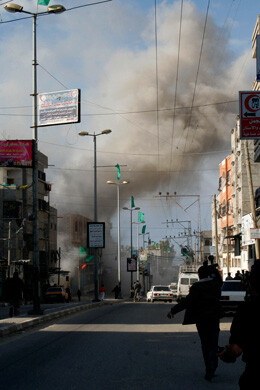Gaza Strip 31 December 2008

A house is bombed in Rafah, southern Gaza Strip, 31 December 2008. (Hatem Omar/MaanImages)
Tobal added ironically, “While other people around the world celebrate, it seems the Israeli air force is trying to save us the cost of fireworks.”
On New Year’s Eve in Gaza, 1.5 million Palestinians are confined to their homes under candlelight and with scarce food supplies, but worst of all with the constant fear of the bombs which have already killed almost 400 people, and injured 2,000.
Peace, only peace is everyone’s wish for 2009. They have no other dreams or wishes but to live in the peace that they have yearned for since Israel occupied their lands in 1967.
But for the fifth day, Israeli warplanes have bombed homes, ministerial buildings, municipal buildings, mosques, universities and charities throughout the densely crowded Gaza Strip. While Israel has attacked Gaza many times, residents say this is the worst they have lived through since the occupation began.
Dr. Asad Abu Sharekh, a university professor and a political analyst who lives at the Tal al-Hawa neighborhood in Gaza City, said, “this world should wake up; instead of dancing and drinking, they should move right away to stop the new holocaust being waged against the civilian population of Gaza.”
“Their [Israel’s] deputy defense minister Matan Vilnai said outright that there would be a greater holocaust,” Abu Sharekh said, referring to comments Vilnai made last March when Israeli bombing killed more than 100 people in Gaza. “The United States has promised Israel thousands more missiles,” he added, “the alleged international community must move to protect the legitimate rights of a people under occupation.”
“Our music for the New Year is the sound of Israeli warplanes, our lights for the New Year is the fire made by Israeli missiles,” said Raed Samir, 32, from the central Gaza Strip. “As you see, I am trying to see a friend of mine at his shop, and that’s what I can do, chatting a bit and smoking a cigarette.”
Ola al-Helo, a 26-year-old woman who works for women’s non-governmental organization in Gaza City, said bluntly of the situation: “It is shit.”
Hamada Hammad, 22, recalled on this day last year, he, his parents, sisters and his brothers-in-law, enjoyed a day out at the Gaza City’s al-Jundi al-Majhoul square.
“Today I can’t even go to my workplace. As you see, warplanes are casting fear everywhere. I hope that young people outside will do something in solidarity with us, the youth of Palestine,” Hammad added.
For the the family of Ali Shaath, 75, of Rafah, at the southern end of the Gaza Strip, New Year’s Eve meant a new refuge as 25 family members fled their home near the border with Egypt to escape Israeli bombing.
Israel has bombed the border area intensively under the pretext of targeting the underground tunnels through which essential supplies are brought into besieged Gaza. The bombing has forced many other families to seek refuge with relatives or in school buildings.
“Can you imagine, we are now crowded into my small two-room apartment, as my parents, sisters and brothers have been forced to stay with me for fear of the Israel air raids on their neighborhood,” said Marwan, 40, one of Shaath’s sons whose home in Bader refugee camp is further from the border.
Marwan did not conceal his outrage when he asked, “What new year celebration? It does not even exist in our terminology. Maybe they have a word for it in Syria or India or Egypt, where I used to live. How can we celebrate when we lack electricity, bread and cooking gas?”
Israel is bombing Gaza under the pretext of stopping rockets fired from Gaza into Israel ever since Israel violated a five-month old ceasefire on 4 November and then tightened its blockade on the Gaza Strip. Israel says its attacks will continue and even escalate and there are reports of preparations for a ground invasion.
Over the past five days, Israeli warplanes have been raiding many parts of the coastal region under the pretext of halting homemade shells fire from Gaza into nearby Israeli towns.
Israel says its attacks on Gaza will continue until the underlined objectives are reached as a ground offensive is looming in the horizon very soon, according to Israeli officials.
Fathi Tobal was right; Israel has saved us the fireworks. Just 20 minutes before midnight, here in al-Maghazi refugee camp, as I write this report, two bombs have hit my town. In Arabic, people exchange the New Year’s greeting, “Kul am wa antum bi khair” (May you be safe and well every year). From Gaza I say, “Kul qasif wa antum bi khair.” May you be safe after every bombing.
Rami Almeghari is contributor to The Electronic Intifada, IMEMC.org and Free Speech Radio News and is a part-time lecturer on media and political translation at the Islamic University of Gaza. Rami is also a former senior English translator at and editor-in-chief of the international press center of the Gaza-based Palestinian Information Service. He can be contacted at rami_almeghari A T hotmail D O T com.
Related Links





